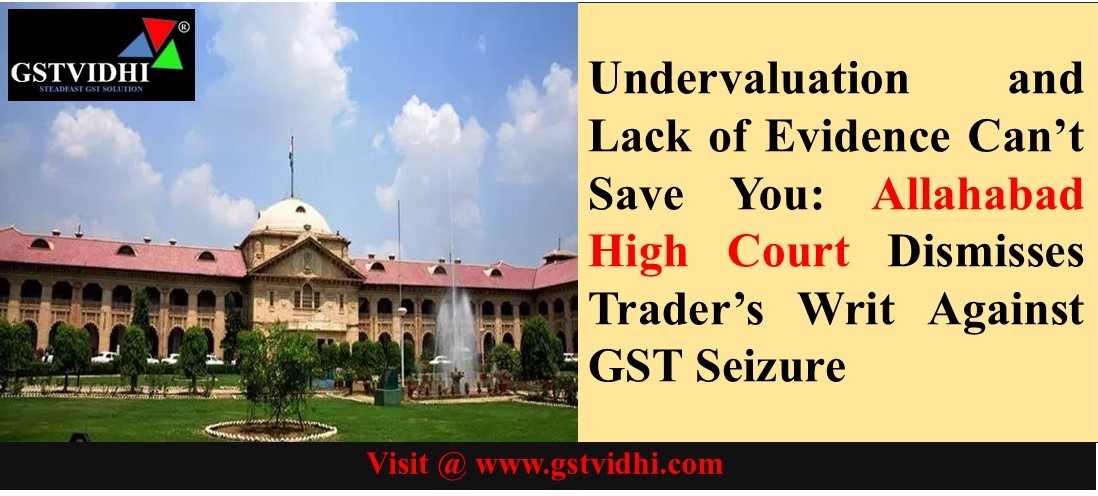
M/s Jaya Traders v. Additional Commissioner Grade-2 & Another
Title of Case: M/s
Jaya Traders v. Additional Commissioner Grade-2 & Another
Case No.: Writ
Tax No. 167 of 2024
Date of Order: 17th
March 2025
Court: Allahabad
High Court, Lucknow Bench
Hon'ble Judge: Justice
Piyush Agrawal
Summary of the
Case:
The petitioner, M/s Jaya
Traders, challenged the order of seizure and penalty passed under Section
129(3) of the CGST/SGST Act, contending that the goods in question were
properly documented and did not require an e-way bill due to their value being
below ₹50,000. The High Court upheld the department’s action, ruling that the petitioner
failed to provide convincing evidence regarding the actual movement of goods,
especially since the driver admitted loading the goods in Kanpur, not West
Bengal. The writ was dismissed.
Facts of the
Case:
- M/s Jaya Traders is a trader engaged
in the sale of chewing tobacco and pan masala.
- The goods were being transported in a
vehicle intercepted by GST authorities.
- The driver failed to produce any
e-way bill.
- The invoices carried were dated 15.09.2021,
and goods were allegedly loaded at Siliguri, West Bengal, destined
for Delhi.
- The value per invoice was below
₹50,000, thus the petitioner claimed exemption from e-way bill
requirements.
- The authorities doubted the
genuineness of the documents, recorded the driver’s statement stating
the goods were loaded in Kanpur, and passed an order under Section
129.
- The appellate authority also
dismissed the petitioner’s appeal.
- The petitioner filed a writ petition
under Article 226 of the Constitution.
Submissions by
Petitioner:
1. E-Way
Bill Not Mandatory:
Petitioner claimed that since each invoice was under ₹50,000, no e-way bill was
needed under Rule 138 of CGST Rules.
2. No
Jurisdiction to Question Valuation:
The petitioner argued that the detaining officer had no jurisdiction to
question the correctness of the valuation during movement.
3. Goods
Were from Siliguri:
Claimed the goods were loaded from Siliguri and en route to Delhi, as per
documents.
Submissions by
Respondent (State):
1. Goods
Actually Loaded at Kanpur:
Driver’s statement showed that goods were loaded in Kanpur, not Siliguri,
suggesting false documentation.
2. Petitioner
Failed to Prove Movement of Goods:
No toll receipts, transport records, or physical proof of goods entering UP
from Siliguri were provided.
3. Documents
Fabricated to Evade Tax:
Authorities believed that the invoices were manipulated to avoid generating
an e-way bill and evade tax.
Findings of the
Court:
1. Burden
of Proof Lies on Assessee in Original Proceedings:
The assessee must prove its claims with cogent evidence in original
proceedings. This was not done.
2. No
Evidence of Movement from Siliguri:
No toll receipts or entry documentation was produced to support the
petitioner’s version.
3. Driver’s
Statement Carries Weight:
The driver clearly stated the goods were loaded in Kanpur, and the same was not
rebutted effectively.
4. Purposeful
Avoidance of E-Way Bill:
The court noted that issuing invoices below ₹50,000 in a split manner
appeared to be a deliberate act to evade the requirement of e-way bill
generation.
5. No
Jurisdictional Error Found:
The court ruled that there was no procedural error or violation of
natural justice in the seizure and penalty order.
Judgment:
“There is no illegality
in the order passed by the authorities below. The petitioner has failed to
prove its case. Writ petition is accordingly dismissed.”
Conclusion:
The High Court upheld the
seizure and penalty under Section 129(3), emphasizing the assessee's
responsibility to establish genuineness of movement and documentation.
The ruling serves as a clear message that non-generation of e-way bill
through undervaluation or false route claims will be treated as a tax
evasion tactic. Transparency and proper documentation are essential in transit
under GST.
Disclaimer: All the Information is based on the notification, circular and order issued by the Govt. authority and judgement delivered by the court or the authority information is strictly for educational purposes and on the basis of our best understanding of laws & not binding on anyone.
Find the Attachment (Press on Click Here )
Click here